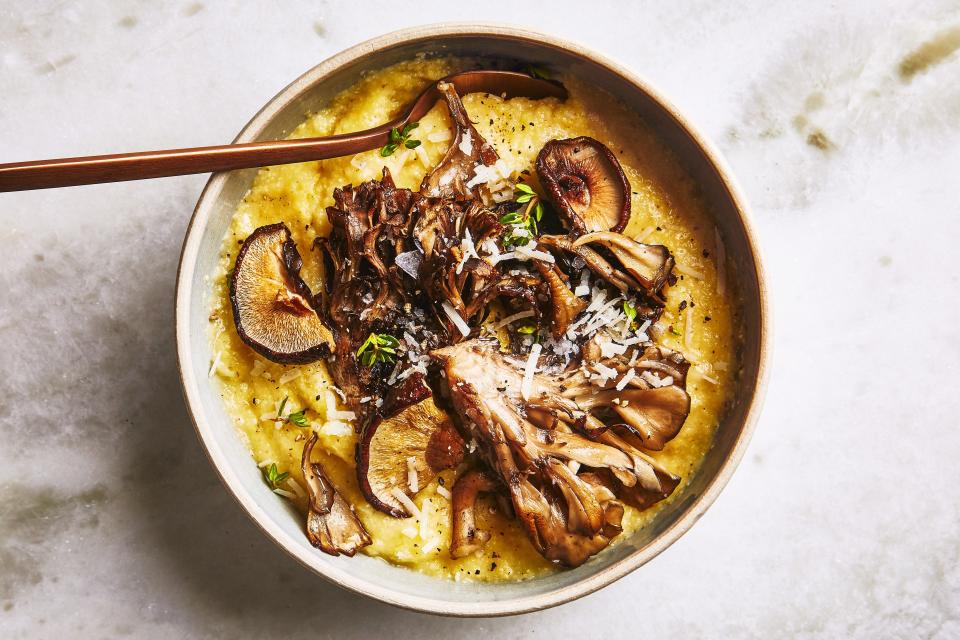How Cooking Every Day Made Me a More Intuitive Eater
Like a growing number of people who are fed up with our $168 billion dollar diet industry, I've been trying for the past few months to eat intuitively.
Picking a laborious recipe can help.
If you're not familiar, intuitive eating is a kind of anti-diet diet. It's about re-learning your hunger cues: eating based on nourishment, satiety, and also just pleasing yourself. Eat when you're hungry, stop when you're full. Eat a balanced diet of whatever you want, which means cookies and also vegetables. Literal babies know how to do this, but as an adult woman deeply entrenched in a lifetime of diet and so-called self-improvement culture, it can feel impossible and complex. One thing has really helped me get back in touch with eating like a normal human being, though. It's cooking—and, in turn, our COOK90 challenge, in which we try to cook almost every meal in January.
When you're first learning to eat intuitively, you're encouraged to follow all of your cravings. The point is to make sure your body isn't feeling limited or restricted in any way. For many people, this means ordering pizza for the first time without guilt. For me, however, it meant a renewed excitement about cooking.
Sure, I already cooked a lot. I work at a home-cooking website—I'm not a fraud. I loved to cook and did, often. But cooking, like eating, was always tied up in equal parts fun and stress for me. Was I cooking what I should be cooking? I really wanted to try the new pasta recipe on our site, but I was avoiding carbs. I wanted to make this squash salad, but I should def leave out the bread part. I had the urge to undertake a baking project, but was scared I'd lose self-control and eat the whole cake before even making it to a friend's dinner party, thus guaranteeing that I'd die alone and also never enjoy another beach vacation for the rest of my life.
But when I gave myself permission to eat whatever I wanted, the cooking possibilities were endless. In the past two weeks, since COOK90 started, I've made carrot flatbread with ricotta and pickled onions (from the COOK90 book!), eggs baked in coconut milk and topped with cilantro, sheet-pan roast sausage with vegetables, oven polenta with mushrooms, and wintery radicchio salad with the compellingly odd combo of oranges and pepperoni. The sheer limitlessness of the possibilities made me want to cook every night—and not just pasta, but a wide variety of things, as it turned out.
"People so often choose foods by whether they're ‘good’ or ‘bad,’ or they think, Am I going to be on the wagon or is this going to be a cheat meal? They aren’t even eating what they feel like eating," says Alissa Rumsey, R.D., a nutritionist who specializes in intuitive eating. As I started to listen to my body more, I found that, sure, I craved pasta, but it was just one thing among many that I wanted to cook, including lots of vegetables, which I wasn't eating because I had to eat them, but because I wanted to.

Oven Polenta with Roasted Mushrooms and Thyme
It makes sense that cooking has helped me eat more mindfully. After all, it takes time and planning to cook for yourself. You've got to make a list, take a trip to the store, and then spend at least 15 minutes putting together the food. When you put in this time and planning, you're automatically going to think more about what you're eating, whether you'll actually enjoy it, and how it will make you feel (because part of intuitive eating is eating to make your body feel good). You'll be more likely to linger over food you took time to prepare, rather than shoveling it back.
For me, eating intuitively sometimes means listening to my body when I'm craving takeout and allowing myself to take more than the three breaks outlined in COOK90. Without the pressure, I cook because I enjoy it—and in turn I'm actually less likely to cave and eat out. The other night, I had a craving for Thai noodles and decided to order them. But then I thought about how the takeout noodles were going to taste, and realized that I would probably end up disappointed. There aren't good Thai options in my neighborhood, and I knew I'd be more satisfied if I made my own rice noodles with a peanutty sauce or udon with grapefruit ponzu and vegetables.
My boss, David, has always said that COOK90 is about becoming a happier and healthier cook—but never about putting pressure on yourself or going on a cleanse. Stress and shame defeat the purpose of COOK90, just like they defeat the purpose of intuitive eating: the goal is to become a better, more confident cook and to incorporate home cooking into your routine, not to pressure yourself into cooking, say, elaborate cassoulets just because they're impressive, or dry egg white omelets just because they're full of protein.
I'm still learning how to do this. But my advice so far is, above all, don't stress. In my experience, the best way to become a more intuitive eater and a better cook is just to do it. Over and over and over again.


